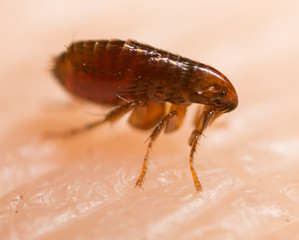Spot on flea treatment is just part of the parasite control strategy…
Fleas are a common problem for pet owners yet despite the multitude of products available, many struggle to get rid of these pests. It is important to appreciate that if you can see fleas on your pet, you are most likely to have an infestation in the home. An effective control strategy must include removing the life cycle stages in the environment.
Fleas can also present other problems, some of which can lead to serious medical conditions such as Flea Allergy Dermatitis and tapeworm infestation. Therefore, it is important to use effective products to combat the problem and to use them regularly according to the instructions.
As our furry friends are a big part of our lives it is important to protect their health as well as our own which is why they should be treated with a de-wormer regularly – at least every 3 months. However, it is recommended that families with young children should worm their pets monthly to protect against Toxocara.
Although the parasites themselves can cause problems, they can also act as vectors or carriers for the transmission of certain diseases. Veterinary advice must be sought before travelling abroad with your pet or importing animals from abroad to assess and protect against potential health risks.











